Sweden - A school-based fluoride mouth rinsing programme
Sweden - A school-based fluoride mouth rinsing programme
Introduction
The Public Dental Clinic in Hyltebruk, a small town in the southwest of Sweden had not been successful in recruiting a dentist and the children in this area were therefore considered to be at greater risk of developing caries. In order to overcome this problem a school-based fluoride mouth rinsing project was introduced at the Örna school in Hyltebruk, in November 2001.
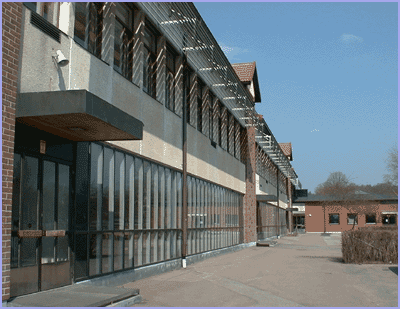
Örna school
Hyltebruk is a small town in the County of Halland and has, as many other small towns in Sweden, experienced some difficulties in recruiting a dentist to the Public Dental Clinic. Presently (May 2002) there is no dentist for this town and dental hygienists and dental nurses mainly carry out the oral health care. This presented an ideal condition in which to implement a prophylactic programme. The Public Dental Clinic in collaboration with the Division for Community and Preventive Dentistry (Head: Dr L.G. Petersson) at the County Hospital in Halmstad, planned and implemented a fluoride mouth rinsing programme.
The initiators behind the project wanted not only to create an interest in the project but also create an awareness of oral health issues and to teach the children how to take responsibility for their own daily oral health care.

Hyltebruk, Halland, Sweden
Project Outline
The programme is based upon voluntary unsupervised daily rinsing with 10 ml of an 0,05% NaF solution. A total of 400 students between the age of 13-15 were offered the opportunity to rinse once daily after having lunch. The project was targeting the children in grade 7-9 as caries prevalence tend to increase between the age of 12-16.
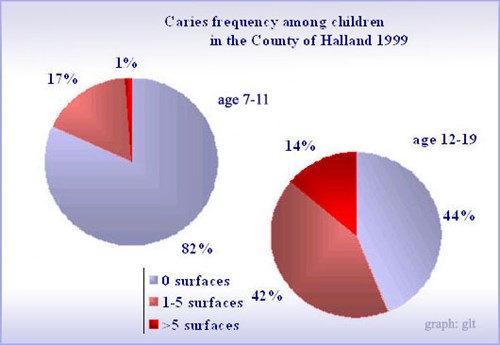
The distribution site is placed in the corridor just outside the school canteen. On the wall above the fluoride there are posters reminding the children of how to rinse properly: 1 minute, once daily after having lunch.
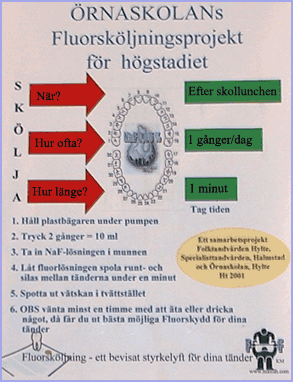
The fluoride solution is available in many different flavours such as peppermint, cola and lemon. The daily handling of the bottles is performed by school cleaning personnel. A dental hygienist makes regular visits to the school in order to check that the project is working properly and fill up the store of fluoride solutions and plastic cups. The cost of the project is mainly paid by the Public Dental Health Clinic. One litre of the solution costs 49 SEK (about 5 US , April 2002). The estimated daily cost per student is 0,5 SEK.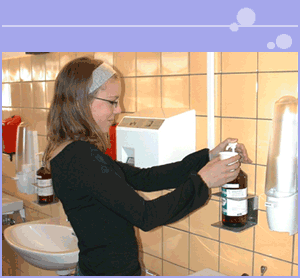
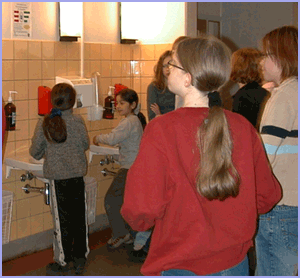
Achievements
Eight weeks into the project a questionnaire was handed out to the children participating in the project, 396 of them replied to the inquiry.
They were asked
- how they had perceived the oral health information given,
- how they felt about the project,
- how often they rinsed,
- drawbacks with the outline of the project and
- they were also encouraged to make comments.
The answers can be compared with the daily consumption of fluoride solution. 3,6 bottles (1000 ml NaF solution) were used up every day, which meant that 72% of the students rinse each day. This number corresponds fairly well with the results from the questionnaire.
- When asked why they rinsed most of the children (84%) answered that they did it in order to avoid dental caries. Other reasons mentioned were that it made them feel fresh, that it removed bad breath after having lunch and that the distribution site was a good place and reason for social interactions.
- When asked why they didn't rinse some stated that they used fluoride mouth rinse at home instead, that they didn't like the taste or that they didn't feel like doing it.
- When asked if they thought they would keep on rinsing with fluorides even after leaving school the answers were less positive. 42% thought that they might keep it up, while only 15% were absolutely sure of that they would continue with the rinsing, 38 % said that they probably would not continue rinsing after leaving school and 5% were absolutely sure that they would not use fluoride mouth rinse.

Not having teeth ...
Conclusions
The results from the questionnaire points to a positive direction as to the participants co-operation and their knowledge on oral health issues. This project will be assessed annually to evaluate the impact on fluoride mouth rinsing programme on teenagers from a small town in Sweden.

Teeth are important ...(woodwork by the children)
This page is based on an Elective work by Leona Malmberg, dental student at Faculty of Odontology Malmö University. We also acknowledge guidance of Dr L.G. Petersson and Kerstin Magnusson, Halmstad, Sweden.
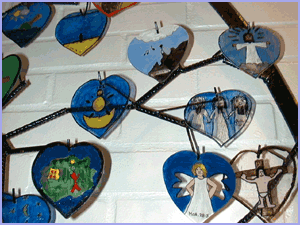
Art by the children
Guest editor: Leona Malmberg
